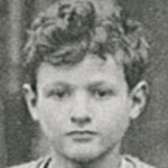
-
Learn More about Alex
Alex Schiffman-Shilo was born in Strasbourg, France, to a Jewish family who had emigrated from Galicia, Poland. His father, Feibisch, was a traveling salesman who sold leather goods, and his mother, Henia Tauba, was a certified Hebrew teacher who worked as a seamstress for Feibisch’s business. She also took care of Alex and his older sister, Madeleine. For work purposes, Alex’s father moved the family to Paris in 1938.
When the Germans invaded France in 1940, Alex’s family fled Paris for the south, where the collaborationist Vichy government took control on June 17. After taking a taxi from Paris to Orléans, the family boarded a train to Issoudun, in the non-occupied zone, which was in close proximity to two manufacturers which were represented by Feibisch.
A few months later, the family moved again, this time further south to Villefranche-de-Rouergue, where Alex’s maternal great-uncle, Max Gottesmann, had lived for decades and was prominent in the fur business. Alex’s mother, Henia, became ill and her youngest sister, Cylli, then came to live with the family to help care for her. In May 1941, Henia died of cancer and was buried in Toulouse. Cylli continued to live with the family in order to look after Alex and Madeleine.
Ten or so other Jewish families lived in the town of Villefranche-de-Rouergue, and the other residents were never hostile toward them. Several times gendarmes (local French police officials) warned the Jews of impending roundups and advised them to go into hiding. On one occasion, Alex spent several nights in the home of his science teacher.
Throughout the war, Alex was able to live quite a normal life, attending both school and summer camp, though he did experience some antisemitism. The summer camp director threatened to expel the three Jewish campers, including Alex. But when his math teacher, who was deputy director of the camp, threatened to resign, the director backed off of his threat.
In September 1943, Croat members of the newly created 13th Waffen SS Mountain Division, also known as Handschar Division, who were training in nearby Le Puy, mutinied against their German officers. The Germans brutally crushed the mutiny and, to cow the French residents of the region, hung posters warning against the influence of the British and the Jews.
Subsequently, the Germans imposed curfews and set up roadblocks. Urged by their Aunt Cylli to seek refuge, Alex and Madeleine passed through a blockade by showing Madeleine’s school ID. Unfortunately, Aunt Cylli had a Polish ID, which might arouse suspicion among the guards at the roadblocks. In order to pass through the blockade without showing her ID, she told the guards that the blockade prevented her from returning home, a short distance away, and they let her pass.
The trio then took a train to a few stops away, getting off near the woods in which their cousin, Asriel, was hiding. Alex and Madeleine who knew their father's travel itinerary managed to get word to him by meeting his train at a nearby station. Nearly missing him on the crowded platform, they glimpsed his face in a window just as the train left. They yelled to him to get off at the next station and walk back to avoid danger in their town. After waiting for ten days in the forest for the danger to pass, they returned home.
Days after Allied forces landed on the Normandy beaches in France on D-Day, June 6, 1944, a German military unit passed through town, shooting randomly from tanks at homes. Alex’s home was not damaged.
Although his immediate family escaped danger during the war, the Germans and their auxiliaries shot and killed Alex’s grandparents in Dolina, southeastern Poland, in August 1942. Three other relatives died in France resisting the Germans: his Great Uncle Max’s son, Armand Gottesman, who fought in the Free French Forces; his mother’s first cousin, Captain Zeff Gottesman, who was killed during the liberation of Toulouse in August 1944; and his first cousin, Captain Lucien Schiffman, who was a doctor in the French underground. Another cousin, Manfred Schiffman, died under the German occupation in France.
Following the war, Alex and his family returned to Paris and, after a legal battle, moved into their pre-war apartment. Alex’s father tried to rebuild his clientele. Alex enrolled in a Jewish boarding high school, was involved in Jewish boy scouts, and, along with Madeleine, attended Zionist meetings and demonstrations. After high school, he studied at the Institut National Agronomique, where he received a master of science degree in agriculture. In 1959 he immigrated to Israel.
Alex lived in Israel for 18 years, serving two years in the Israel Defense Force and then working as an agricultural advisor for the Israeli government and, later, the United Nations. In 1989, he moved to the United States along with his wife, Amy. Alex, who had three children, volunteered at the United States Holocaust Memorial Museum.
